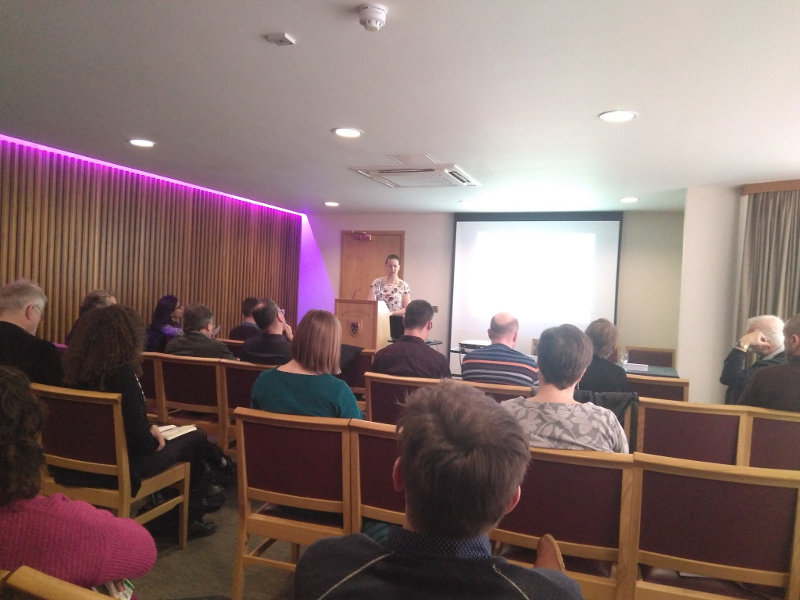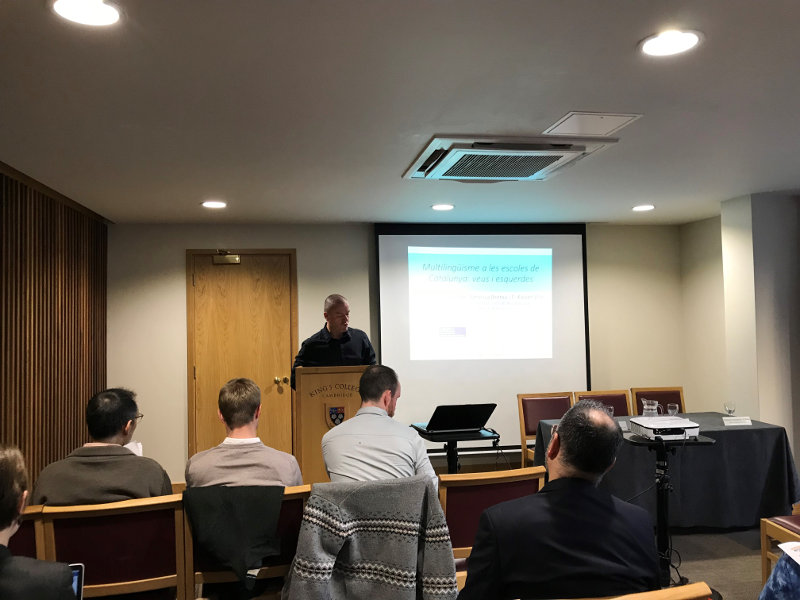
On 19-20 January, Strand 1 of the MEITS team hosted the conference ‘(Dis)articulating Identities: Multilingualism in the Catalan Countries’ at King’s College, Cambridge. The event brought together international scholars and practitioners across a broad range of disciplines and career stages in order to discuss the case of multilingualism and its particular implications within Catalan culture and society.
The first day included the panels: Education, Variation, Immigration; The Languages of Images; and From Transculturation to Multiculturalism traversing the fields of sociolinguistics, audio-visual culture and cultural activism. Building on many of themes raised over the course of the previous day, Saturday’s panels moved into literary and performative territory through: Politics, Sexuality and Other Modes of Communication; (M)other Tongues and Melancholy Selves; and Translation, Theatre and Other Performative Acts.
The whole event was a great success and its diversity and impact was widely praised by both participants and attendees. As well as an encouraging write-up in the Catalan online media https://www.vilaweb.cat/noticies/botifarra-dou-autentica-opinio-llengua-gela/ (site in Catalan) below is a selection of the overwhelmingly positive feedback we received:
“Key issues related to multilingualism, culture, and identity were being addressed in innovative ways. All the speakers came from different backgrounds and subdisciplines, but all of them made a real effort to address the themes of the conference in meaningful ways, and as a result I felt that a proper space for interdisciplinary conversation was being created. This was a very, very productive and useful event […], I am sure [it] will make an important contribution both to Catalan studies and to the interdisciplinary study of multilingualism and culture.”
“Thank you for organising the event as it's not often that [as undergraduate students] we have the opportunity to engage first hand with academics in Catalan. I found it to be particularly beneficial for improving my listening skills.”
“The conference […] was an excellent opportunity to discuss perspectives and realities both mediating and resulting from multilingualism. The current political situation in Catalonia and the Spanish state makes particularly relevant the exchange of views on diversity and processes of construction of identities in the Catalan Countries and beyond. As a postgraduate student and early career researcher, I benefited immensely from the debates, questions and networks ensured by this academic event. The conference gave me the opportunity of disseminating my work amongst more experienced scholars, whose feedback will have a very positive impact on my research.”
“The conference was, without exaggeration, a great success. It was extremely well organized, both logistically and in terms of content, and the level and diversity of discussion were outstanding. The list of participants was impressive and there was ample opportunity for networking, discussing projects and exchanging ideas regarding the ways in which multilingualism can empower individuals and transform societies. Every panel was engaging and provided valuable insights into the complex use of languages in society. Thank you for all you did to make participation in this event so interesting, pleasurable and rewarding. I'm convinced that this conference will prompt a deeper examination of multilingualism in Catalan society and will result in further projects and collaborations.”
“First, it gave Catalan Studies a significant space within the frame of the major research on Multilingualism. Secondly, the Conference’s humanistic approach to Multilingualism meant that not only linguists (sociolinguists) were able to attend and give papers, but scholars coming from all over the world and from different disciplines, working on literary, visual and cultural studies, found easy accommodation in the superbly well-organized sessions, which provided a sense of continuity that everyone noticed and applauded. Senior researches mingled with the University of Cambridge undergraduate and postgraduate students and the exchange of ideas was fruitful to everyone.”







